|
|
 |
|
Storm Home -
Mods -
Specs -
Research -
Blog -
History -
Links -
RTR Policies
|
GM MAP sensor Identification
I once got ripped off by ordering a 3Bar MAP sensor from some idiot on Ebay---he actually sent me a 1BAR! So....to make sure it didn't happen again, I did some research on how to identify a GM MAP sensor.
|
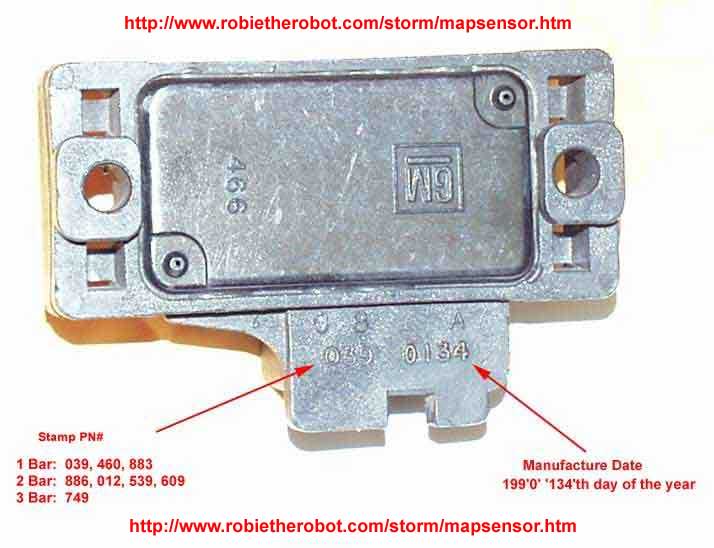
3 digit numbers for identification:
1 Bar: 039, 460, 883, 876, 153
2 Bar: 886, 012, 539, 609, 701
3 Bar: 749, 861
|
|
Believe in Karma? Donate!
The logic module uses the manifold absolute pressure (MAP) sensor to determine the absolute pressure (not the relative to atmospheric pressure) of the air inside the intake manifold and the atmosphere (barometric pressure).
This information is used to determine the density of the air entering the combustion chamber (in conjunction with the IAT(Intake Air temperature) sensor), which is used when calculating the proper air/fuel mixture for the engine, especially at WOT since the system is not in closed-loop at this time.
It is also used to help adjust the IAC(Idle Air Control) motor during idle.
It uses a silicon wafer that is thinner in the center (0.001") than around the edges (0.045"), which causes it to act as a diaphram.
It is mounted with a perfect vacuum beneath the chip so that the air pressure from the other side flexes the chip.
This flexing causes a change in resistance and the circuitry inside the sensor converts this to a voltage ranging from 0.02V to 4.94V when the output is pulled up towards 5V by the ECM(Electronic control module).
1 Bar MAP sensors are used on NA(naturally asperated) vehicles.
2 Bar MAP Sensors are used on forced induction vehicles(Turbo & Supercharged). They can measure up to 2x the apmospheric pressure(29.4psi), so that means it can measure up to 14.7psi boost(the atmosphere is 14.7psi + 14.7psi from the turbo/supercharger).
3 Bar MAP sensors can measure up to 44.1psi, which translates to 29.7psi boost from a Turbo/supercharger.
They all share a common pinout, although the connector keying may be different:
Pin A -- Ground
Pin B -- Sensor output
Pin C -- +5 volts
Places to order MAP Sensors
Amazon:
GM 3 BAR map sensor
or
You can order them direct from:
www.SummitRacing.com
PN# MSD-2313 3bar MAP
PN# MSD-2312 2bar MAP
PN# MSD-2311 1bar MAP
or
www.GMPartsDirect.com
PN# 12223861 3bar MAP
PN# 16040609 2bar MAP
PN# 16137039 1bar MAP
|
|
|
|
The chart below describes the pressure-to-voltage relationship of the stock GM Turbo MAP sensor (2 bar):
Manifold Pressure
(relative sea level / absolute)
|
2 Bar
MAP Output
|
| 14.31psi / 29.01psi |
4.90V |
| 14.00psi / 28.70psi |
4.84V |
| 13.00psi / 27.70psi |
4.67V |
| 12.00psi / 26.70psi |
4.50V |
|
11.00psi / 25.70psi
|
4.33V
|
|
10.00psi / 24.70psi
|
4.16V
|
|
9.00psi / 23.70psi
|
3.99V
|
|
8.00psi / 22.70psi
|
3.82V
|
|
6.00psi / 20.70psi
|
3.47V
|
|
4.00psi / 18.70psi
|
3.13V
|
|
2.00psi / 16.70psi
|
2.79V
|
|
0.00psi / 14.70psi
|
2.45V
|
|
5.00inHg / 12.24psi
|
2.03V
|
|
10.00inHg / 9.78psi
|
1.61V
|
|
15.00inHg / 7.33psi
|
1.19V
|
|
20.00inHg / 4.87psi
|
0.77V
|
|
25.00inHg / 2.41psi
|
0.35V
|
|
29.10inHg / 0.40psi
|
0.02V
|
MAP sensor output based on altitude (Ignition "ON" and engine stopped)
| Altitude | Voltage Range |
| Meters | Feet | -------------- |
| Below 305 | Below 1000 | 3.8--5.5V |
| 305--610 | 1000--2000 | 3.6--5.3V |
| 610--914 | 2000-3000 | 3.5--5.1V |
| 914--1219 | 3000--4000 | 3.3--5.0V |
| 1219--1524 | 4000--5000 | 3.2--4.8V |
| 1524--1829 | 5000--6000 | 3.0--4.6V |
| 1829--2133 | 6000--7000 | 2.9--4.5V |
| 2133--2438 | 7000--8000 | 2.8--4.3V |
| 2438--2743 | 8000--9000 | 2.6--4.2V |
| 2743--3048 | 9000-10000 | 2.5--4.0V |
| Low altitude = High Pressure = High Voltage |
GM 1bar, 2bar, 3bar
1 PSI = 2.036" of Mercury (HG)
1" mercury = 0.4911541 PSI
Formula for the GM 3 Bar MAP sensor is (V*8.94)-14.53
I have no idea why it's 14.53 and not 14.696, [rounds up to 14.7] but it works out on GM's chart every time. It is possible that Detroit is slightly above sea level, and you can use 12.11 in the formula for 1 mile above sea level.
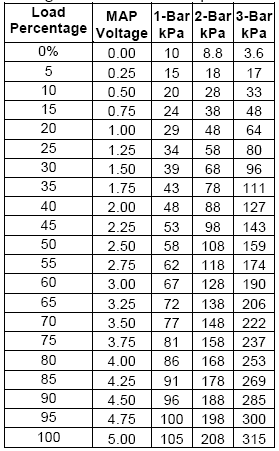
MAP Sensor CEL errors
On 1995 and newer vehicles with OBD II self-diagnostics, a DTC code P0105 through P0109 would indicate a fault in the MAP sensor circuit:
P0068: MAP/MAF - Throttle Position Correlation
P0069: Manifold Absolute Pressure - Barometric Pressure Correlation
P0105: MAP Circuit Malfunction
P0106: MAP/Barometric Pressure Circuit Range/Performance Problem
P0107: Manifold Absolute Pressure/Barometric Pressure Circuit Low Input
P0108: MAP Pressure Circuit High Input
P0109: MAP / Baro Pressure Circuit Intermittent
P1106: MAP/BARO Pressure Circuit Range/Performance Problem
P1107: Barometric Pressure Sensor Circuit Low Voltage
On older pre-OBD II vehicles, the MAP codes are:
* General Motors: Codes 34, 33, 31
* Ford: Codes 22, 72
* Chrysler: Codes 13, 14
On vehicles that provide data stream through a diagnostic connector and allow a scan tool to display sensor values, the MAP sensor's output voltage can be read and compared to specifications. Basically, you want to see a quick and dramatic change in the MAP sensor signal when the throttle on an idling engine is snapped open and shut. No change would indicate a sensor or wiring fault.
If the sensor is reading low or there is no reading at all, check for proper reference voltage to the sensor. It should be very close to 5 volts. Also check the ground connection. If the reference voltage is low, check the wiring harness and connector for looseness, damage or corrosion.
Scan tools that display OBDII data will also display a "calculated load value" that can be used to determine if the MAP sensor is working or not. The load value is computed using inputs from the MAP sensor, TPS sensor, airflow sensor and engine speed. The value should be low at idle, and high when the engine is under load. No change in the value, or a higher than normal reading at idle might indicate a problem with the MAP sensor, TPS sensor or airflow sensor.
Delphi MAP sensor CAD
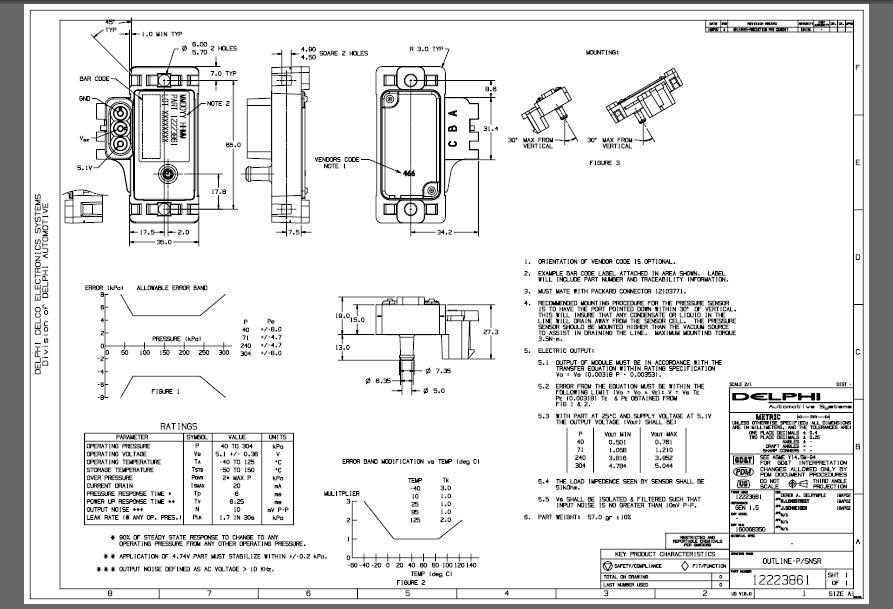
Delphi MAP sensor electrical output
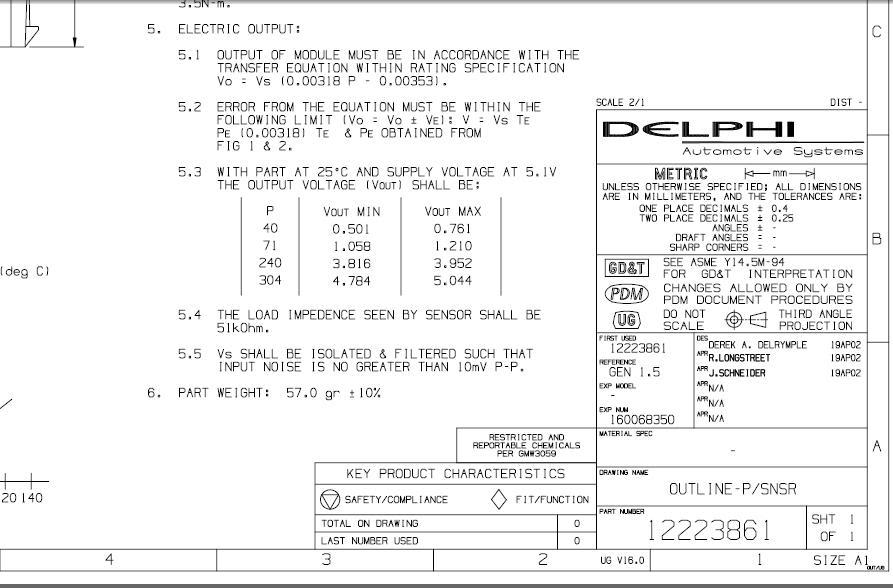
Delphi MAP sensor operational ratings
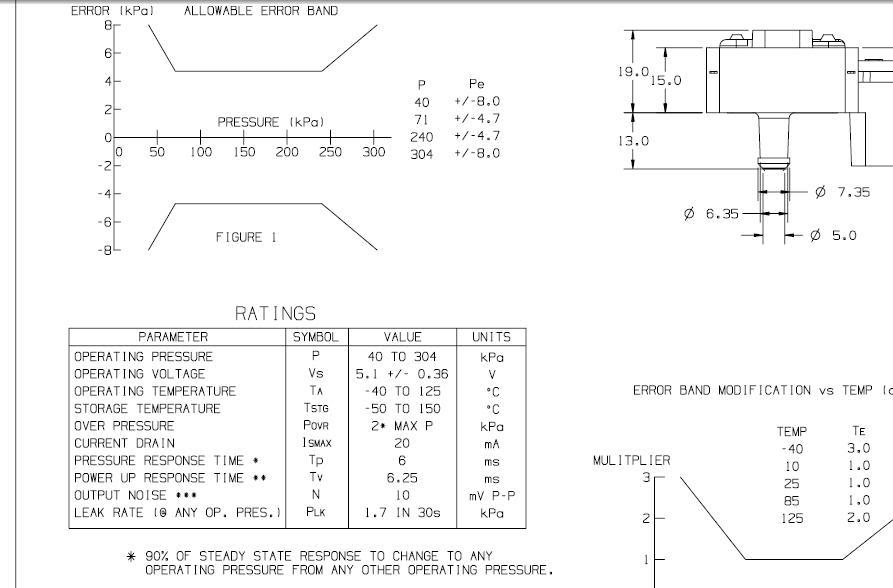
|
|


All contents are Copyright © 2026 .
All Rights Reserved. All trademarks are ownership of their respective holders. |
|


